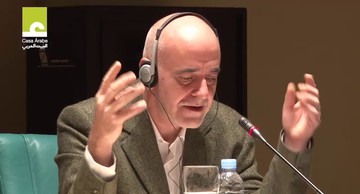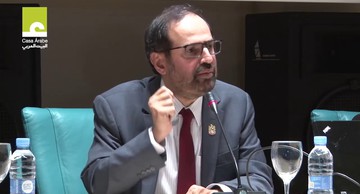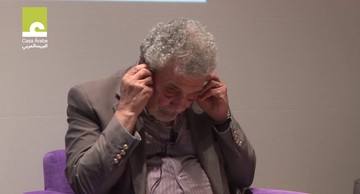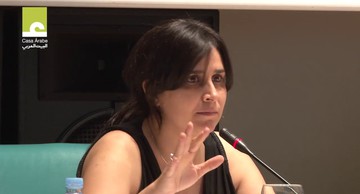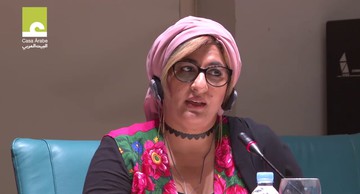

Gender Politics in Tunisia and Libya (Arabic)
نشرت 09 مارس 2021
ALL VIDEOS IN THIS CATEGORY
-
Chant Avedissian: Redressing Identity (ENGLISH)
2017.18.10. Conference given by Nigel Ryan, art critic and cultural editor at the Al-Ahram Weekly newspaperfor for nearly two decades and Sabrina Amrani, a gallery owner, on the occasion of the opening of the exhibition "Chant Avedissian. A Levantine Heading East”. Born in Cairo (1951), Aveidssian is one of the Egyptian artists to have best kept identity and popular traditions, but from a modern perspective. A tireless traveler who has gone from Egypt to Uzbekistan, his observations on decorative and architectural pieces are reflected in his work, made using various techniques: stencil, textile, photography, gouache on cardboard, etc. Art critic Nigel Ryan spoke about this artist's work within the context of art in Egypt during the twentieth century, a period that can be viewed as an attempt to construct a coherent national style. Political engagement and notions of authenticity were central to this endeavour which continues to cast a shadow over contemporary production. In “Redressing Identity”, Nigel Ryan argues that Chant Avedissian’s artistic practice and work constitute a radical critique of a process that resulted in the promotion of exclusion and the straitjacketing of art rather than any expansion of horizons. Nigel Ryan has lived in Egypt since 1989. For 18 years he was the cultural editor and art critic of the Cairo-based newspaper Al-Ahram Weekly. He has written extensively on contemporary Egyptian art and the wider cultural scene, chronicling – among other things – the emergence of independent art spaces in the decade preceding the Arab Spring. His work has appeared in many publications, including Grand Street, New York; Journal of Comparative Criticism, Cambridge University Press, and Alif: Journal of Comparative Poetics, American University in Cairo Press. More info: http://en.casaarabe.es/event/chant-avedissian-redressing-identityنشرت 26 اكتوبر 2017 -
Efforts by the United Arab Emirates to fight extremism (ARABIC)
2017.10.11. Given by Ali Rashid Al-Nuaimi, Chairman of the Board of Directors of Hedayah (International Centre of Excellence for Countering Violent Extremism). Also taking part were Hissa Abdullah A. Al Otaiba, the Ambassador of the United Arab Emirates, and Pedro Martínez-Avial, the General Director of Casa Árabe. Since it was founded in 1971, the United Arab Emirates (UAE) has spared no efforts to fight the scourge of terrorism and extremism. The country has enacted laws and regulations to fight against terrorism and violent extremism by collaborating in the field of international court cooperation not only in the Middle East region, but also at the international level. Within this context, at the initiative of the UAE’s President, Sheikh Khalifa bin Zayed Al-Nahyan, in 2012 the International Centre of Excellence for Countering Violent Extremism (Hedayah) was founded as a center associated with the “Action Group to Counter Violent Extremism” in the United Kingdom. Hedayah was created in response to the increasing will of the members of the Global Counter Terrorism Forum (GCTF) and the international community to set up an independent, multilateral center devoted to dealing with this strategic challenge in the long term. To achieve this, the entity works to design national strategies to fight violent extremism that include not only stemming the recruitment of new combatants, but also dismantling extremist ideologies. With this goal in mind, its experts uphold that it is necessary to work with communities, get religious leaders involved and build alternate narratives. More info: http://en.casaarabe.es/event/efforts-by-the-united-arab-emirates-to-fight-extremismنشرت 18 اكتوبر 2017 -
The Shell, by Mustafa Khalifa (ARABIC)
This Syrian author is presenting The Shell: Memoirs of a hidden observer in Al-Assad’s jails at Casa Árabe, along with its Spanish-language translators, Ignacio Gutiérrez de Terán and Naomí Ramírez Díaz. Mustafa Khalifa (Jarabulus, Syria, 1948) was arrested for the first time in 1979. After his second arrest in 1982, upon returning to his country after studying film in Paris, he spent thirteen years in Al-Assad’s jails, most at the military prison of Tadmur, in Palmyra. This experience forms the core of the tale that we are presenting: The Shell: Memoirs of a hidden observer in Al-Assad’s jails, translated into major languages, and achieving acknowledgments for the author, such as the Free Press Award, in 2014. In his acceptance speech for this award, the author stated, “Syrian human beings are surrounded on all sides by a wall of death, a wall raised by the fanatical forces represented by Al-Assad and Hezbollah’s militias, and the different factions of Al-Qaeda whose entry into Syria was facilitated by Al-Assad himself. Syrian human beings are beginning to lose faith in the values of freedom, justice and brotherhood which mankind has expressed throughout history... the silence over the crimes committed against Syrians are incomprehensible to them. And what is even more incomprehensible and unjustifiable is the fact that this endures without the slightest attempt to take action to put a stop to the crimes against civilians.” Presentation information sheet Tadmur Prison, built by the French government in the 1930’s, was blown up by the Islamic Army after taking over Palmyra in 2015, an action criticized by many of those who suffered in jail there. They considered it to be a symbol of oppression and slavery under the regime of the Assad dynasty. Inside its walls, the indiscriminate killing of 500 to 1,000 prisoners took place, as they were mowed down with machines guns inside their jail cells by forces under the command of Rifaat Al-Assad, Hafez Al-Assad’s brother, in response to an attack against him. More info: http://en.casaarabe.es/event/the-shell-by-mustafa-khalifaنشرت 13 اكتوبر 2017 -
Women and political resistance in Yemen (ENG)
06-13-2017. Casa Árabe invited the journalist and blogger Afrah Nasser to analyze the ties linking gender, culture, Islam, power and social change in Yemen. Taking part in the conference are Afrah Nasser, a Yemeni journalist and blogger, and Leyla Hamad, a researcher for the Political and Electoral Observatory of the Arab and Muslim World (OPEMAM). The high rate of gender inequality in Yemen means that women have very few rights in terms of education, marriage and medical care, as well as other basic human rights. Moreover, the combination of statutory law, Sharia, traditional tribal practices and customary law leave women vulnerable to violence and discrimination. The current war in Yemen has sharpened these deep inequalities, all of which is made even worse by the humanitarian crisis. Nevertheless, since the popular uprising in 2011, a political culture of feminist resistance has been forming, which must be analyzed and highlighted, with the example of the Nobel Peace Prize awarded to activist Tawakkol Karman. Afrah Nasser is an independent writer and award-winning blogger whose work focuses on human rights violations, women’s rights and the politics of Yemen. She has worked as a reporter for the newspaper Yemen Observer and began her blog on the uprisings in Yemen (http://afrahnasser.blogspot.com.es) in 2011. That same year, hers was selected by CNN.com as one of the “must-read” blogs on the Middle East, and she was highlighted among the 100 most influential Arabs by the magazine Business Arabian. In 2011, she became a political refugee in Sweden, the country where she completed her graduate studies in Communication at the University of Göteborg, where she is one of the co-founders of the NGO The Yemeni Salon. More info: http://en.casaarabe.es/event/women-and-political-resistance-in-yemenنشرت 28 يونيو 2017 -
Talk with the Emirati director Nujoom Alghanem (ARABIC)
06/02/2017. Nujoom Alghamen met with the public on the occasion of this screening of her documentary "Nearby Sky" (Samma Qarribah)(United Arab Emirates, 2014, 95 min.). The screening was part of the film series "New filmmakers from the United Arab Emirates", curated by Alejandra Val Cubero and organized by Casa Árabe, which introduces a new generation of directors who have come onto the scene over the last decade. About "Nearby Sky" (Samma Qarribah)(United Arab Emirates, 2014, 95 min.). Fatima Alhameli was the first Emirati women who owns camels to get her camel signed up for a contest and take part in camel auctions in the United Arab Emirates. Despite all the difficulties and challenges encountered when attempting to demonstrate that she could compete in one of the most male-dominated fields, Fatima’s desire to win a race or contest remains the only way to make up for her failures and overcome them. Fatima’s story is reflected in a unique way in this film, which shows the path she has chosen and the challenges she has faced both socially and personally. Right when Fatima begins to lose hope, an unexpected reward comes into her life. More info: http://en.casaarabe.es/event/new-filmmakers-from-the-united-arab-emiratesنشرت 15 يونيو 2017

